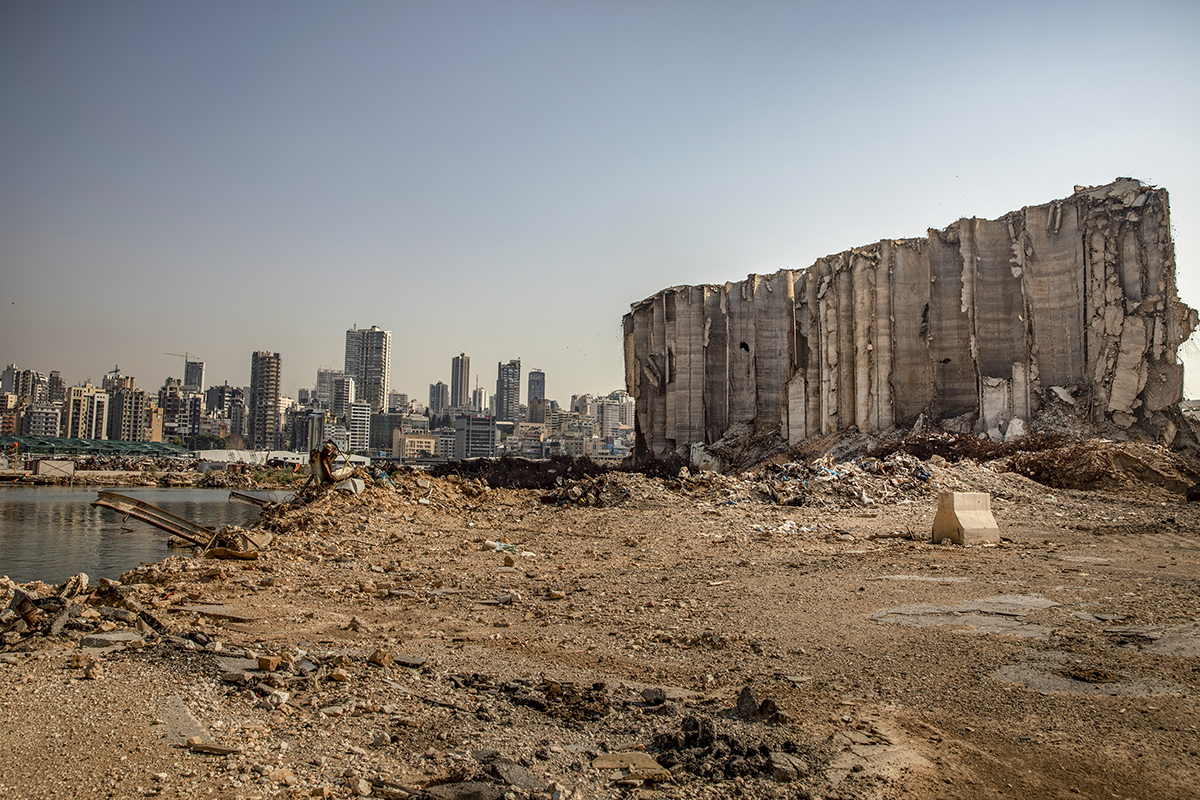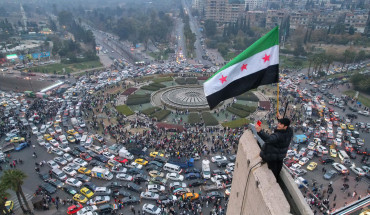

Introduction
On August 4, 2020, images out of Beirut shocked the world. Hundreds of tons of ammonium nitrate exploded in the capital’s port, destroying most of the city and leaving behind 206 victims, thousands of injured, and hundreds of thousands of displaced. In this series, guest contributors join MEI’s resident and non-resident experts to reflect upon the political, legal, urban, and foreign policy implications of what may well be Lebanon’s crime of the century.
Photo by Francesca Volpi/Bloomberg via Getty Images
Viewpoints
-
Christophe Abi-Nassif
Christophe Abi-Nassif

The danger and opportunity of the moment
Lebanon's post-Taif political establishment and overall system of governance have consistently imposed on the Lebanese people a tradeoff between justice and civil peace. When the civil war ended, a general amnesty law in 1991 shielded the country’s warlords from prosecution and paved the way for sectarian power-sharing in times of peace. Anything but war, people thought. When the Hariri tribunal issued a tempered and yet clearly incriminating verdict in 2020, its findings went unimplemented for fear of triggering Hezbollah and stirring sectarian strife. Anything but more war, people continued to think. At every critical juncture over the past 30 years, the Lebanese have had to pay twice: first when tragedy hits, and then when it goes grossly unpunished. More often than not, it feels as if Lebanon wants the truth but doesn’t know what to do with it.
A year after the Beirut port blast, the answer to that question is crystal clear: holding criminals accountable and ending a political era that has been teetering since the Lebanese uprising began in October 2019. This of course rests on the assumption that Lebanon will actually reach the truth. The scale, magnitude, and reverberations of the Beirut blast trauma make that assumption inevitable. When so much has been lost, the risk of losing the little that remains becomes inconsequential. Both the danger and the opportunity of the moment lie in that reality.
On the one hand, the Lebanese political establishment has shown time and time again that it won’t go down without bringing the country down with it. A potential indictment of front-row senior officials and their refusal to submit to eventual court trials may lead to political violence. Worse, if Hezbollah is found to be involved in importing and storing the ammonium nitrate at the port, civil strife may ensue. Unlike events such as the Hariri assassination that essentially required one party — his — to absorb the blow and move on, it will be quasi-impossible to bury this investigation’s findings. The unavoidable clash between enforcing justice and evading it may therefore permeate the country.
On the other hand, however, the blast has perversely shaped collective Lebanese memory and cemented the clear-cut distinction between the “alternative and secular us” and the “traditional and sectarian them.” Scarred by the port tragedy, unified by the quest for justice, and exhausted by the socio-economic and financial collapse, average Lebanese citizens are slowly but surely pulling out of the submissive relationships to sectarian leaders. Change will no doubt come in phases and may even be marred by violence, but what happened in Beirut on August 4, 2020 will forever mark the collective conscience, serve as a rallying cry, and seed the organizational philosophy of Lebanon’s alternative movement.
As Lebanon approaches the one-year “anniversary” of the Beirut port blast, one thing is certain: the pent-up feelings of loss, trauma, and anger will eventually erupt in the absence of real and systemic accountability. The scenes that will unfold on the streets of Beirut on August 4 of this year will set the stage and tone for the next phase of confrontation with the political establishment.
Christophe Abi-Nassif is the Director of the Middle East Institute’s Lebanon Program.
-
Randa Slim
Randa Slim

What should US policymakers learn a year after the blast?
There are three lessons to learn. First, the political class is united around the objective of obstructing the investigation of the Beirut port blast that killed more than 200 people on August 4, 2020. A year on, the Lebanese government’s investigation has stalled due to obstruction by the political class. No one in Lebanon, including the victims’ families, expects that this investigation will result in credible outcomes, if it ever reaches that stage. This is why in June, 53 Lebanese, regional, and international groups and individuals, as well as 62 survivors and families of the victims, signed a letter urging members states of the U.N. Human Rights Council to establish an international investigative mission into last year’s blast.
Second, the political elites are also united around the objective of maintaining the status quo, no matter how disastrous the consequences are for the Lebanese people. Their calculus is heavily weighted in favor of obstructing reforms that upend their ability and that of their business partners to extract rent on virtually every economic activity in the country. Neither the deteriorating economic conditions nor bottom-up pressure by Lebanese civil society have changed their calculus. Top-down pressure has not fared better partly due to divisions within the international community, particularly between the United States and France, over sanctions. A corruption-focused sanctions regime put in place by the U.S., the EU, and Arab countries targeting political and business elites that have obstructed reforms should be part of a sustained commitment by the international community to influencing positive change in Lebanon
Finally, U.S. policymakers must understand that U.S. policies that to-date rested on the assumption that there are good and bad guys among Lebanese political and business elites are bad policies. There are no good guys. All of the elites are bad, and some are worse than others. The U.S. bet should be on the Lebanese people, who are today working and organizing to change the status quo. They are demanding that elections now scheduled for mid-2022 be held on time and be strictly monitored. Any economic rescue package to be negotiated in the near future by the international community with the Lebanese government should condition aid on holding these elections on time.
Randa Slim is the Director of the Conflict Resolution and Track II Dialogues Program at the Middle East Institute.
-
Rima Majed
Rima Majed

The final blow is yet to come: Lebanon’s interregnum
This is not a commemoration of the August 4th Beirut port explosion. It is difficult to commemorate the past when it has not passed. Political commemorations require a certain distance, a certain “transition” to have happened before ceremonies to remember the atrocity and honor the victims and survivors can take place. Such a transition is not only about attaining legal justice in courts, especially when there is no trust in the Lebanese judiciary system, which still gives impunity to criminal politicians. There is equally no reason to trust international courts, particularly after the experience with the Special Tribunal for Lebanon, which cost the country over a billion dollars and led nowhere. Transition in this case is about the ability for the August 4th explosion to become from the past, and for time to make room for the emergence of a new political reality. Until then, Lebanon will continue to live in an interregnum, where the old political arrangement of the Taif agreement is dying and the new political settlement is yet to be born. In such a period, social, political, and chemical explosions are expected to multiply until they deal the status quo a final blow.
While the October uprising of 2019 gave hope for the possible transition to a new political system, the developments since point to the repositioning of the ruling elites and the intensification of a — so far — “cold war” that is going to determine which parties will survive and take over the new Lebanese formula that will emerge. This power struggle is clearly reflected in the difficulties of forming a government. The history of Lebanon has taught us that changes in the power balance within the delicate sectarian system have always come with war and blood. The Second Republic of Lebanon, based on the sectarian parity between Christians and Muslims, has come to an end. Today, Hezbollah is continuing to lead the struggle for a constitutional change that would maintain the structures of the sectarian neoliberal regime but give it more constitutional dominance through the redistribution of power into thirds (between Christians, Sunnis, and Shi’as). This political struggle within the regime comes against the backdrop of fast social and political transformations since 2019 caused by the dramatic financial collapse, the massive exodus, the collapse of the country’s already fragile infrastructure, and the breakdown of the social order.
However, what happened in Beirut on August 4th, 2020 is bigger than just internal political dynamics, and it requires much more than holding a few men responsible in court for the destruction of half a city and its people. Lebanon’s internal power dynamics are heavily entangled with regional ones. Therefore, any serious attempt at justice after the August 4th explosion will have to tackle at once the internal culprits and move beyond the borders of Lebanon to answer big questions about the role and responsibility of major political players at the regional and international level — starting with Lebanon’s two neighboring countries (Israel and Syria) and not ending with the international powers that control global maritime movement and security. Who sent such amounts of explosives to Lebanon in 2013 and for what reason? How did the explosives go unseen by powers that control maritime movement? How were they used between 2013 and 2020, and who benefitted from them? How did they explode and who ignited them? And why did they explode at this specific time? Answering such questions will probably find many regimes and regional/global powers implicated and will expose the links between the local criminals and the global ones. In this sense, justice for the victims and survivors of the August 4th Beirut port explosion can only be political.
Rima Majed is an Assistant Professor of Sociology at the American University of Beirut (AUB) and a non-resident scholar with the Middle East Institute’s Lebanon Program. Her research focuses on social movements, sectarianism, conflict and violence, and gender and intersectionality in the Middle East.
-
Mona Fawaz
Mona Fawaz

Accountability for just urban futures
“We are asked to repair 50 years' worth of serious damage and neglect of the housing sector," explained one of the architects leading on-the-ground post-disaster repairs in Beirut's devastated neighborhoods. Indeed, the heavy toll of the August 4, 2020 explosion on the city's fabric cannot only be explained by the weight of the exploded ammonium nitrate. Without absolving the criminals or the callous decision-makers from any responsibility for the blast itself, it is imperative to recognize the city's vulnerability, a vulnerability manufactured by three decades during which everyday livelihoods in the neighborhoods had been sacrificed in the name of attracting financial investments.
As such, the port blast came as an accelerator, precipitating a pattern of residents' evictions and heritage demolition that had steadily progressed for the past three decades. It was incentivized by so-called financial and economic policies that sought to use land and homes as real estate to attract foreign capital into the country, even when the latter led to empty buildings. In this model, life itself is dispensable when it doesn't involve one's kind.
Had homes not been deliberately emptied to make way for speculative investments, had rental contracts not been designed to evict tenants anytime a developer finds a lucrative opportunity, had old owners not been reduced to fighting for their shares of ownership tooth and nail against so-called financial investors, had heritage buildings not been deliberately neglected so that they crumble and circumvent ill-designed heritage freezes that fail to protect them, then the port blast's disastrous impacts in displacing residents permanently and devastating the city's heritage would not have been as overwhelming. In addition, the task of reconstruction would not be as daunting had it not been for the economic meltdown that forces city dwellers to choose between paying rent, repairing a home, or feeding one's children.
It is consequently imperative not to limit the debate on accountability to the port blast, as if the latter was an exceptional circumstance in the ordinary course of Lebanon's national history. On the contrary, the blast fell neatly into the logic of Lebanon's post-civil war model of governance, one which rested on a culture of unaccountability that absolves crimes and prioritizes speculative, unproductive investments over long-term inclusive and viable development. It's not too late to look back to this recent past and avoid another post-disaster recovery that consolidates the effects of the crisis it claims to address rather than establish equitable grounds on which a just future is built.
Mona Fawaz is a Professor in Urban Studies and Planning at the American University of Beirut (AUB) and a non-resident expert at the Middle East Institute’s Lebanon Program. Mona’s research spans across urban history and historiography, social and spatial justice, informality and the law, land, housing, property, and space, as well as planning practice, theory, and pedagogy.
-
Lynn Maalouf
Lynn Maalouf

This time there is no moving on
The clock ticks louder every day as we inch toward August 4, 2021, 6:07pm — as does our angst and rage. Throughout this past year, we have been reeling from the cataclysmic blast that ripped through and crippled our lives, and left to fend with the fear, loss, grief, and pain in a country irremediably and literally sliding into darkness as a direct result of its political leadership’s failures.
Throughout this past year, we found out our president knew about the danger but did nothing. We found out scores of other senior political, military, and security officials knew but did nothing. We were tear gassed and shot at when we went to the streets still littered with shattered glass — four days after the blast — to demand justice. We found out, weeks later, from a German company that there was another explosion waiting to happen at the port.
Yet, through all this, we have also watched the victims’ families and the survivors lead a historic battle for justice and accountability. Why historic? Because this is a shift in the country’s decades-old entrenched culture of impunity. Here, we have experienced war in its ugliest shapes and forms — air-dropped bombs, car bombs, sniper killings, abductions and disappearances, sieges and starvation, forced displacement, mass killings, during a 15-year war and episodically in subsequent decades.
Victims, entire communities, were told to forget and move on. Warlords became political and security officials thanks to a post-war amnesty law and constitutional immunities carefully crafted to shield them. The very same immunities they are claiming today as the lead investigator into the blast seeks to question a number of them.
Unlike in the past however, this time there is no moving on. Unlike in the past, victims and survivors have forcefully and relentlessly mobilized to demand accountability even as they have seen their right overstepped and denigrated by an entire political class seeking to shield itself from scrutiny, citing worn-out excuses of immunity, when such immunity does not — under Lebanon’s obligations under international law, that is — and cannot stand in the face of an event of such scale.
The clock ticks louder as we draw closer to that fateful date. But that date is no anniversary, nor will it be, until there is truth, justice, and reparations for the victims’ families and survivors.
Lynn Maalouf is the Middle East research director for Amnesty International in Beirut, Lebanon











